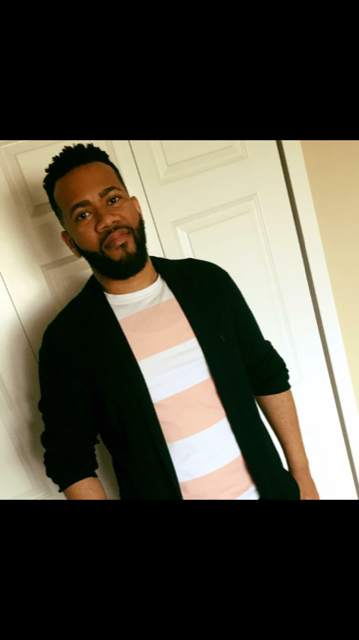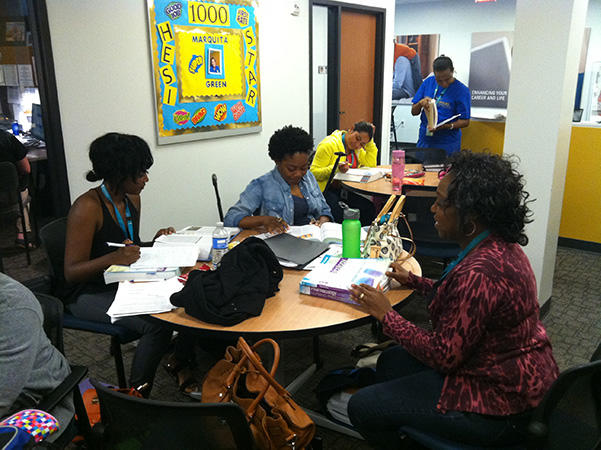Featured
Tags
Share
- Home / Blog / Campus News / Johnnie Jackson Turns Racist Words and Actions into Ways to Strengthen His Character
Johnnie Jackson Turns Racist Words and Actions into Ways to Strengthen His Character

He’s been unnecessarily stopped by police, previously dismissed as a manager despite his impressive pedigree and teased about his shade of Blackness. But Johnnie Jackson, BAHRM, who works at Chamberlain University, said this is common ground for those among his race. The challenge is not having the autonomy afforded to his white counterparts because ‘check ins’ with family and friends has become the norm during mundane outings.
“The family must know where you are at all times — even at the store or gym. You have to be as safe as possible,” explained the executive admissions representative who worries about his sister living in another state and working late hours. “You always have to be aware of your surroundings and remember you could be targeted even when you haven’t done anything wrong.”
Johnnie is saddened and horrified at the cyclical mistreatment of Blacks by the police. “People who look like me are losing their lives. It’s hard to wrap your head around and realize this is the world we live in. I have always worked amongst people who I felt respected me, were on my side and wanted the best for me. To think that some of these people may not have felt that way — not because of my education but because deep down, they thought I shouldn’t have what I have because I’m Black — is demoralizing and emasculating. Your education is no different than mine; my blood, sweat and tears went into my education and nothing was ever given to me. It’s a struggle to see the fruits of my labor receive a different type of affirmation because I’m Black.”
Rejection Based on Skin Color
Johnnie recalls the constant power struggle when interviewing for jobs against white counterparts — the competition wearing expensive suits, exuding race confidence and subtly yet deliberately displaying disrespectful racist mannerisms. “It hurts to be disregarded because of the color of your skin but that adversity can be used as a catalyst to go beyond. I hear social media and the news and it takes a toll but something inside of me says to keep pushing forward.”
Taking a stand against racial injustice has become Johnnie’s unspoken mantra. Raised in the Chicago suburbs, he remembers an amazing childhood — living in a beautiful home with a single mom who worked tirelessly to provide amenities. In junior high, he learned firsthand about the cruelty of his peers who taunted him about being a light-skinned Black youth. “They said I was piss color and a house Negro. I already faced disparity but now I was being segregated even more. I learned I would be judged by how I wore my hair and what I wore. There were always unspoken but implied rules for Blacks. But all that just made me stronger.”
After college, Johnnie started his career like many others in his family — as a mail carrier for the U.S. post office. He also worked part time at an upscale department store and quickly climbed ranks, earning a manager position. He recalls judgmental co-workers and customers at both locations, who discriminated because of race, gender, age and education. “There was a visible, blatant type of ignorance. People judged by what they saw and assumed, not based on who I am or my competence. I can’t let things like that knock me off my game and compromise who I am or put my job on the line.”
Knowledge is Power
Johnnie is now completing his master’s degree in organizational leadership and is considering a future in management or perhaps as an adjunct professor. He stands proudly on the shoulders of his intellectual ancestors, including his great grandmother, a college graduate who served as an educator in Mississippi during segregation. “Like her, I’m going to continue to push through despite the struggles and disparities.”
Though COVID-19 has temporarily stopped his community efforts to Step Forward, the cuisine connoisseur is reaching out to the Chicago small businesses he frequented as a youth, many of them Black-owned and vandalized during the recent riots. “I want to support them and put an awareness out there so they don’t go out of business.”
He also hopes to soon mentor Black youth about today’s racial disparities so they can avoid a lifelong battle of being ostracized. “They could be the next George Floyd. Or, like me, they could get pulled over because they’re ‘driving while Black’ and being detained for no reason. They need to be cautious and do whatever they need to come back home. People don’t know how this feels until it happens to them or to someone they know. We’re not asking for empathy but the understanding that this does affect everyone to some degree. We need to raise awareness and dialog and keep seeing the progress.”
Chamberlain Diversity and Inclusion
Chamberlain University is committed to fighting racism, hatred and inequality in all forms in our programs, in our workplaces and in the communities we serve. We are discussing best practices for managing issues of social justice and hosting vital discussions not only for healing, but also for action.
Your ideas and perspectives are critical as the University as we evolve our comprehensive approach and specific strategies that enhance our culture of care, diversity, equity and inclusion. We welcome your feedback and look forward to our upcoming discussion to hear about your concerns and hopes for the future. Please email us at feedback@chamberlain.edu.
By Heather L Hurtado
More from Campus News
Request More Information
To receive the Chamberlain University Program Guide, including associated career paths, please select a program of study.






